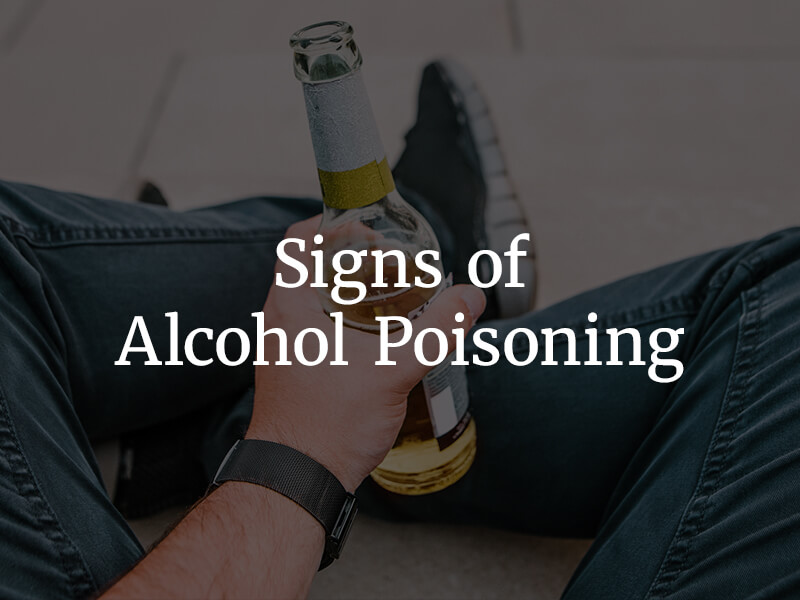13 Signs of Alcohol Poisoning
Alcohol poisoning is another phrase for alcohol overdose. The body can only process so much alcohol in a short period. Consuming too much alcohol too quickly can lead to the poisoning of the organs. If you suspect someone could be suffering an alcohol overdose, call 911 for help immediately. This is a serious condition that could be fatal. Alcohol poisoning can cause permanent organ damage, seizures and death.

13 Signs To Look Out For
Statistics show an increased rate of alcohol consumption over the holidays. The booziest holiday is Mardi Gras, followed by New Year’s Eve and St. Patrick’s Day. Thanksgiving is also a boozy holiday, with the average person drinking 2.3 times more than he or she would on a different day. An increased amount of drinking leads to a corresponding increase in alcohol poisoning cases and car accidents. Recognizing the signs of alcohol poisoning could enable you to save a life at a party or event this holiday season.
- Mental incapacity
- Confusion or memory loss
- Aggression or outbursts
- Slurred speech
- Pale or blue-colored skin
- Flushed skin
- Dehydration
- Vomiting
- Fluttering eyelids
- Decrease in body temperature
- Slowed or irregular breathing
- Loss of consciousness
- Seizures
Alcohol poisoning occurs because your liver can only break down so much alcohol at one time. The liver will hit a limit on how much alcohol it can metabolize in a short period. What it cannot break down will then cycle through the rest of the body. In general, a person’s liver can metabolize one unit of pure alcohol per hour (about the same as a half-pint of beer or a small shot). Drinking more than this will lead to alcohol accumulating in your body, giving you a ‘drunken’ feeling as it affects your nervous system. If you continue drinking past this point, you could be at risk of alcohol poisoning.
How to Help
If you notice someone exhibiting signs of alcohol poisoning, act fast. If the person is unconscious and you cannot awaken him or her, he or she could be at risk of dying. Call 911 immediately and request paramedics for the individual. Err on the side of caution – alert the police if you are not sure how much alcohol someone has had to drink. Immediate medical care may be the only way the person is going to survive.
Never leave an unconscious person alone. The alcohol poisoning could trigger the individual’s gag reflex while he or she sleeps, causing the person to potentially choke on his or her vomit. Try to help the person into a sitting position while you wait for help. If you cannot make the person sit up, at least turn the person with his or her head to the side to prevent choking. Do your best to keep the person awake until paramedics arrive.
Treating alcohol poisoning often takes a trip to the hospital. The individual may need to receive fluids or medications intravenously to help with the breakdown of alcohol and recovery. The person may also need supplemental oxygen, nutrients and medications to prevent seizures. Prompt medical care can prevent long-term outcomes from alcohol poisoning, but the individual may still suffer organ damage. Consistent patterns of heavy drinking can increase the risk of alcohol poisoning.
How to Check BAC
The more alcohol a person consumes, the more alcohol the bloodstream will contain. Blood-alcohol concentration (BAC) is a measure of how much a person has had to drink based on how much alcohol remains in his or her bloodstream. In California, the maximum BAC level a person can have while driving is 0.08%. The police often use Breathalyzer devices to analyze a driver’s breath sample for alcohol. If you wish to check your or someone else’s BAC without an official device, use a tool such as Alcohol.org’s online BAC calculator for a rough estimate.
The BAC calculator processes a person’s gender, weight, alcohol intake and how much time has passed to estimate his or her blood alcohol concentration level. Note, however, that the online tool is not an official test of one’s BAC. You should not use it to see if you are too drunk to legally drive. If you have had any alcohol to drink, find a sober ride home. Otherwise, you could risk getting a DUI – or worse, causing an accident.

